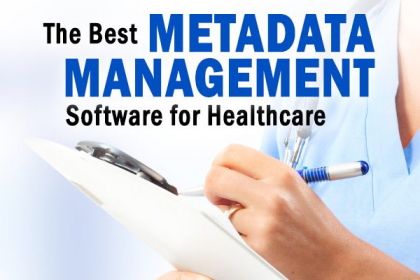

Solutions Review’s listing of the best metadata management software for healthcare is an annual mashup of products that best represent current market conditions, according to the crowd. Vendors are assessed if they have a dedicated offering designed for professionals in this industry.
The editors at Solutions Review have developed this resource to assist buyers in search of the best metadata management software for healthcare to fit the needs of their organization and use case. Choosing the right vendor and solution can be a complicated process — one that requires in-depth research and often comes down to more than just the solution and its technical capabilities. To make your search a little easier, we’ve profiled the best metadata management software for healthcare providers all in one place. We’ve also included links to each company’s industry-specific product page so you can learn more.
Note: The best metadata management software for healthcare is listed in alphabetical order.
Alation Data Catalog helps you find, understand, and govern all enterprise data through a single pane of glass. The product uses machine learning to index and make discoverable a wide variety of data sources including relational databases, cloud data lakes, and file systems. Alation democratizes data to deliver quick access alongside metadata to guide compliant, intelligent data usage with vital context. Conversations and wiki-like articles capture knowledge and guide newcomers to the appropriate subject-matter expert. The intelligent SQL editor empowers users to query in natural language, surfacing recommendations, compliance flags, and relevant policies as users query.

Alex Solutions is a technology agnostic unified enterprise data catalog. It features a business glossary that enables users to define and maintain key business terms and link them to physical data assets, processes, and outputs. Policy-driven data quality combines data lineage with data profiling and machine learning-based intelligent tagging. Alex also offers intelligent tagging that helps users add business context to physical data assets. Deployment and integration are simple, and the product’s user interface is friendly to business users.

Collibra’s Data Dictionary documents an organization’s technical metadata and how it is used. It describes the structure of a piece of data, its relationship to other data, and its origin, format, and use. The solution serves as a searchable repository for users who need to understand how and where data is stored and how it can be used. Users can also document roles and responsibilities and utilize workflows to define and map data. Collibra is unique because the product was built with business end-users in mind.

IBM’s InfoSphere Information Server features a metadata repository that stores metadata from suite tools and external tools and databases and enables sharing among them. Users can import metadata into the repository from multiple sources, export metadata by various methods, and transfer metadata between design, test, and production repositories. Changes that are made in the repository are automatically made throughout the suite, and uses standard relational database technology.

Informatica Metadata Management allows enterprises to tap into four major categories of data, including technical, database schemas, mappings and code, business (glossary terms, governance processes), operational and infrastructure (run-time stats and timestamps), and usage (user ratings and comments). Informatica creates a knowledge graph of an organization’s data assets and their relationships by applying AI and machine learning. Active metadata serves as the foundation for Informatica’s Intelligent Data Platform.

Octopai is a centralized, cross-platform metadata management automation solution that enables data and analytics teams to discover and govern shared metadata. The product does metadata scanning by automatically gathering it from ETL, databases and reporting tools. Metadata is stored and managed in a central repository, and a smart engine using hundreds of crawlers searches all metadata and presents results quickly. Octopai is best used for use cases in business intelligence, governance, and data cataloging.

Oracle Enterprise Metadata Management is a metadata management platform that can harvest and catalog metadata from any provider. The product allows for interactive searching and browsing of the metadata as well as providing data lineage, impact analysis, semantic definition, and semantic usage analysis for any metadata asset within the catalog. Oracle Enterprise Metadata Management also touts advanced algorithms that stitch together metadata assets from each of the providers.

Platform: OvalEdge
Description: OvalEdge offers an on-prem data catalog and governance toolset that crawls databases, data lakes and back-end systems to create a smart catalog of the information. The product provides a discovery platform that both novice and experienced analysts can use to discover data quickly. OvalEdge includes built-in governance tools that help define a standard business glossary, data assets, PIIs and limits access by various roles. It also organizes data automatically via machine learning and advanced algorithms.

SAP offers its metadata management capabilities via SAP PowerDesigner, SAP Information Steward, and SAP Data Intelligence. SAP utilizes metadata integration for multiple DBMS platforms, across the SAP ecosystem, with available integrators for BI platforms, data modeling solutions, and other data integration software. Users can ingest metadata from other tools to create reporting and monitoring systems for data migration and data valuation as well. Metadata discovery data modeling and scenario analysis are available via SAP Data Intelligence.

Smartlogic Semaphore is an enterprise-grade semantic platform that allows organizations to enrich data, extract facts, and harmonize information sources. The product features a model-driven, rule-based approach that enhances the capabilities of existing technologies. Smartlogic allows users to drive self-service delivery as well as move enterprise search from keyword to semantic to find data related to a query. Smartlogic is known for its excellent modeling, metadata transformation, and creation capabilities.









